Pence v Kaine: Who won the vice-presidential debate?
- Published

Talking past each other
It was a scattershot debate marred by frequent interruption, where moderator Elaine Quijado lost control of the discussion for stretches. In the end, however, it was a battle that Mike Pence won.
The Trump-Pence ticket is still losing the war, however, and Tuesday night's debate likely only succeeded in keeping hope alive that Donald Trump can mount a comeback.
That's a low bar, but - as the saying goes - it ain't nothing.
For the last week, it's felt a bit like Donald Trump was routed. His woeful first presidential debate performance was compounded by a series of unforced errors, capped by an early morning Twitter tirade and a damaging New York Times story about his near billion-dollar business losses in 1995. His poll numbers headed south.
The Republican vice-presidential nominee's primary job - really his only job - was to stop the bleeding and give the campaign an opportunity to regroup. Mr Kaine's goal was to keep him from doing that.
Mr Pence succeeded. Mr Kaine, while unloading a crate of opposition research on Mr Trump, failed. Here's why.

Cooler heads prevailed

Mr Pence spent the latter part of the 1990s as a radio talk-show host, and his media experience showed. Where Mr Kaine had an over-caffeinated demeanour, particularly early in the debate, Mr Pence came across as calm and measured.
He didn't get rattled, and he didn't make any unforced errors that would dominate the headlines tomorrow.
Mr Pence was added to the ticket to serve as an emotional counterbalance to Mr Trump's fiery, blunderbuss style - and Tuesday night showed why that was probably a good idea. A Chris Christie or Newt Gingrich surely would have mounted a more spirited attack on Mrs Clinton's record.
Mr Pence honestly didn't land too many blows on the Democrat. But first things first. He had to put out the raging dumpster fire that was his team's campaign over the past week.

Defending conservatism

Having said that, sometimes it seemed like Mr Pence was operating in a parallel universe than the one that Mr Trump has inhabited over the past year.
Time and again, when Mr Kaine pressed him on Mr Trump's past controversial statements and positions, Mr Pence defended Mr Trump the way he wanted him to be, not the way he really is.
Take, for example, the exchange on Russia. Mr Pence warned of the threat the nation posed to world order and tried to lay its growing assertiveness at Mrs Clinton's feet. He called Russian President Vladimir Putin a "small and bullying leader" who wasn't confronted by the Obama administration.
As Mr Kaine was quick to point out, however, Mr Trump has showered the Russian president with praise, calling him a "strong leader". A hard line against Russia is certainly a traditional Republican position - Mitt Romney embraced it in 2012 - but it's hardly where Mr Trump stands.
Pence and Kaine clash over Russia and Putin
It almost seemed like Mr Pence was more interested in making the case for conservatism the way Americans have known it over the last 30 years than mounting a spirited defence of Mr Trump's actual positions and statements.
That may help some wayward Republicans return to the fold in the short term. They need to be back in Mr Trump's column if he wants to make this presidential race competitive.
Oh, and it also may not be a bad move for Mr Pence if he wants to position himself as a possible candidate for the 2020 Republican nomination.

Trump taxes

If there was one exchange that illustrated the challenges Mr Pence faced in defending Mr Trump - and how he, for the most part, survived them - it's the issue of Mr Trump's tax returns.
It's obviously an area Democrats want to exploit. Hillary Clinton hit the Republican on it multiple times in recent days, and her press aide Jennifer Palmieri told reporters at the debate site that Mr Trump's possible failure to pay income taxes gives Democrats an opening among white working-class voters.
When Mr Pence was first asked about Mr Trump's break with 40 years of tradition by not making them public, he changed the subject. When Quijado pressed him, he said the leaked 1995 tax returns highlighted by the Times showed Mr Trump went through some tough times and "brilliantly" used the tax code "just the way it's supposed to be used".
Vice-presidential candidates clash over Donald Trump's tax history
Mr Kaine pressed him on why Mr Trump has broken his pledge to release his full tax returns, and Mr Pence retreated to Mr Trump's debunked line that he could only do so after he's done being audited (a process that Mr Trump himself has said has been going on for 15 years).
With results like that, it was no wonder Mr Pence would rather not talk about Mr Trump's record. He put the exchange behind him, however, and moved on to more favourable terrain.

Pence's parries

Mr Pence's political jujitsu throughout the debate was quite a remarkable feat, really.
When Mr Kaine confronted him on Mr Trump's past controversies, he responded by asserting that the Clinton team was the one waging an "insult-driven campaign".
When Mr Kaine attacked Mr Trump's proposed ban on Muslims entering the US, Mr Pence said "we're going to put the safety and security of the American people first".
When Mr Kaine noted that Mr Trump had suggested women who have abortions should be subject to criminal penalties (a position he later recanted), Mr Pence said they "would never support" such legislation - and then, when pressed, said Mr Trump wasn't a polished politician and "things don't always come out exactly the way he means them".
"Six times tonight, I have said to Governor Pence I can't imagine how you can defend your running mate's position on one issue after the next," an exasperated Mr Kaine said at one point. "And in all six cases, he's refused to defend his running mate."
"I'm very, very happy to defend Donald Trump," Mr Pence said - but then opted to change the subject. It clearly frustrated Mr Kaine, it probably will give fact-checkers fits, and Democrats will be in up arms. But it allowed Mr Pence to move on - and, if the Republicans are lucky, turn the page in the coming days.
That is exactly what Mr Trump needs.
This debate likely will have little effect on the overall poll numbers - they historically never do. What happens next is up to Mr Trump. Mr Pence did his part, now his running mate has two debates left to take advantage.